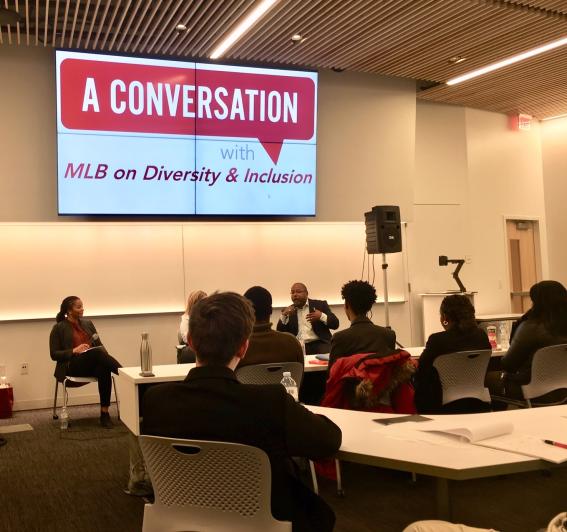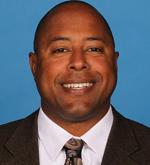Major League Baseball Talks Diversity
February 12, 2019

That sparked a soul-searching reassessment of diversity issues in the team’s organization, and it uncovered racial affronts directed at full- and part-time employees that hadn’t been discussed by leadership before. Sadly, confronting the broader issue required the abuse of a player, Kenn told a room packed with career-seeking students.
The candid conversation between Kenn and Tyrone Brooks, the senior director of the Front Office and Field Staff Diversity Pipeline Program for Major League Baseball (MLB), covered both the inner workings of their organizations’ efforts to foster inclusiveness as well as opportunities and challenges for students and graduates looking to build careers in sports organizations. “You can’t do this by yourself,” Brooks emphasized to the room packed with students from Isenberg and the colleges of engineering, computer sciences, social and behavioral sciences, and natural sciences.
The debut of Isenberg’s Conversation series of discussions on diversity and inclusion in business was coordinated by Nefertiti Walker, the school’s Associate Dean for an Inclusive Organization. “The series strives for intimate discussions of tough subjects that plague the workplace,” observed Dr. Walker, who moderated the hour-long panel discussion.
Organizational Solutions

“The biggest thing for us is finding qualified individuals from diverse backgrounds,” continued Brooks, who described MLB’s Diversity Fellowship Program, founded in 2017. Twenty-two recent college graduates are in the current class for the program, which offers participants a deep dive into Major League Baseball, including its operations, culture, and human resources challenges. That includes, he noted, exposure to skills like analytics in the fast-evolving business of sports. “Last year, we sent 21 of our students to a Sabre analytics conference in Phoenix,” he remarked.

Connections Matter
“Everyone needs a mentor,” Kenn insisted. “As a mentee, be curious, be unafraid to ask everything.” A UMass Amherst graduate in sport management, Kenn launched her career with guidance and connections from a UMass mentor. “He connected me with the Sox,” she says.
“All it takes is one person to get into the industry. It’s a people business,” remarked Brooks, who invited the students to join his network on LinkedIn for advice and leverage. “Don’t underestimate the power of internships,” he added. “And learn to function and succeed outside your comfort zone.”
“You’re not growing unless you’re comfortable being uncomfortable,” Kenn chimed in. “It’s important to find your allies.”
Dr. Walker concurred with one qualification: “Your allies may not always look like you, so be open to working with different people from different walks of life” she reminded the students.